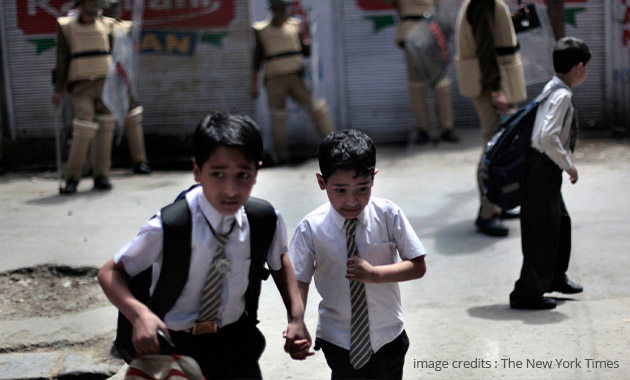“What mental health needs is more sunlight, more candor, more unashamed conversation” –Glenn Close (American Actress)
Those who do not suffer or have suffered from mental health issues often tend to misunderstand it. But if someone doesn’t understand it, nowhere it means that it can’t be true. Effects of lockdown on children are for sure exhibiting in a serious and unpleasant way. Researchers believe certain feelings are common in any epidemic viz; that feeling of helplessness, loneliness, and fear of being socially excluded, or separated from loved ones Other factors like prolonged stress, boredom, and social isolation, as well as a lack of outdoor play, affect mental health conditions in children causing anxiety and even depression. They even fear falling behind in their education adding to their feelings of deprivation and anxiety. A survey done among parents has reported more agitation, increased screen-exposure, and changed eating patterns among children during the nationwide lockdown owing to coronavirus disease (Covid-19).

IMPACT ON CHILDREN
COVID 19 is indeed a global phenomenon but children in Kashmir being already vulnerable to severe anxiety, now have been facing a breaking point. Kashmiri children have already been on edge after years of erratic education, conflict, and civil disharmony. Extended school closures have aggravated their stress and anxiety as reported by Child psychologists and Teachers. Also, various experts and mental health professionals have been reporting day in and day out about such issues among Children.
- A child and adolescent psychiatrist at the Institute of Mental Health and Neurosciences (IMHANS) in Srinagar, Dr. Syed Karrar believes that the rise in depression and behavioral changes among children is caused due persistent disturbance in formal schooling which gives limited opportunities to socialize, and unpredictable schedules.
- Mental health professionals like Farhana Yaseen say, children who already are facing issues of mental illness or those in vulnerable home environments, COVID-19 worries are increasing new pressures for such children. She even cited the case of a 14-year-old who was already diagnosed with obsessive-compulsive disorder (OCD) who reached out to counselors after a COVID lockdown began through a helpline. The teen’s symptoms had worsened due to the pandemic. He complained of fear of contamination, excessive hand washing, and compulsively checking the news. Since April, 124 patients have been referred to the IMHANS center with corona virus-related stress and anxiety, along with more than 800 children and teens who receive counseling by phone. But she believes these numbers don’t reflect the full extent of mental health issues.
- Apart from disrupting academic schedules, prolonged lockdown could have a psychological impact on children. Arif Maghribi Khan, a psychiatrist in Srinagar believes that the primary impact of lockdown will be on the socialization skills of children. He even explained that when a child is sitting in a classroom with 10 other kids, the child learns to interact with 10 different people but that can’t happen in an online classroom. He even believes that children might grow in a way the child will be reluctant towards socialization.
- According to a Doctors Without Borders study in 2016, 45% of the population in Kashmir was experiencing “mental distress.” Pandemic has worsened the already grave situation pertaining in the valley
- At the child guidance and well-being center run by UNICEF at the Shri Maharaja Hari Hospital (SMHS) in Srinagar, since COVID outbreak hundreds of mental cases have been reported…
- As per the clinical psychologist Shahnawaz Alam, isolation has given rise to the anxiety among youngsters. He has been repeatedly saying that these unwanted thoughts of getting infected by coronavirus has caused further stress and triggered changes in behavior patterns among children in the Kashmir valley.
- According to experts a major concern that has aroused during the pandemic is a rise in suicidal thoughts among children which have been recorded in more than 50 percent of child mental health cases. Almost 16 people lost their lives in 20 days mostly including youngsters who have been reported by Kashmir Age, a local newspaper on 10 August 2020.
ROLE OF PARENTS
The child-parent relationship has a major influence on most aspects of child development. When it comes to parenting, it is more about the safety of the child than her/his privacy. Parents need to pay attention to recognize and assess early signs of anxiety and depression in order to help their children overcome the negative impact of emotional problems.
- BEING INVOLVED IN YOUR CHILD’S LIFE – Being an involved parent takes time and hard work. It involves rethinking and rearranging their priorities. Be there for the child mentally as well as physically. It doesn’t mean doing your child’s homework instead let your child’s teacher know honestly what your child is learning
- KEEP YOUR CHILD BUSY- Parents should have a proactive and calm conversation with their child about coronavirus disease (COVID 19) so that they can play whilst taking necessary precautions and keeping them healthy.
- BOOSTING YOUR CHILD’S SELF ESTEEM- Praise your child on his or her accomplishments even if they are very small and it will make them feel proud. Letting your kid do things independently and praising them will make them feel capable and strong. Do not belittle your kids’ efforts or compare them with others and make them feel worthless, it will just add to their anxiety and make them depressed. Always remember to choose your words compassionately and carefully.
- TALK TO YOUR KIDS- Parents need to talk to their kids about what their daily structure will be, plan accordingly how they will handle stress and when they can take a break from teleworks or schoolwork to relax and connect with each other.
- SPEND QUALITY TIME- In these distressing times; parents should spend more quality time with their kids so that the children don’t feel isolated. Kids who do not get enough time with their parents often misbehave due to the anger and anxiety that they would feel being alone without them. You need to schedule time together and look for ways to connect with your child.
- CREATE FAMILY SPACE- All family members need to monitor their own behavior, talk, and process difficult emotions. They need to think about balancing feelings and finding distractions to allow kids relief from feeling upset.
- KEEP AN EYE ON CHILDREN- Establish some house rules so that your kids know your expectations and learn self-control. It’s possible that during this lockdown kids are having more screen time than we normally would. As with any screen time – it’s good to know what your kids are watching and doing online, set parental controls. Parents should educate their children about the dangers of the virtual world and should monitor their online activities.
- LIMIT THE NEWS- Parents should limit Covid-19 news for children especially those suffering from mental illness. It is their responsibility to provide children with the necessary information of COVID 19 and curtail sharing unnecessary disturbing information to their kids which can instill fear and cause anxiety among them.
- ENCOURAGE CREATIVENESS- Carving out space for your kid so that they can be creative, keep it simple, and help them pursue their passion. Share your experience with them and reason with your kids to allow them to understand and learn from you. In case there are problems, describe them to your kids, express your feelings, and invite them to work on a solution with you.
- SPREAD POSITIVITY- Parents should create a positive environment at home. They not only need to motivate their kids to keep learning but also keep them happy and focus on their mental health and well being amidst the rising anxiety and isolation.
- SHOW YOUR LOVE- Loving your kids won’t spoil them only material indulgence in the name of love would. Love can be as simple as sharing hugs, spending time and listening attentively to their issues, keeping an open mind, and picture what they are ṣgoing through to help them through those emotional tantrums and solve their problems with a positive attitude.
- TREAT YOUR CHILD WITH RESPECT- Give your child the same courtesies as you give to anyone else. Speak politely with your kid, and respect his opinion. Pay attention to him or her when they are speaking and also treat them kindly. Else they would have low self-esteem and would feel that it is the way they should be treated, again increasing anxiety and adding to the depression.


